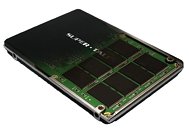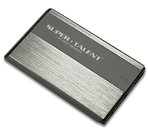Wednesday, September 17th 2008
Super Talent Launch Fast SSDs under the MasterDrive Series
Super Talent Technology, a leading manufacturer of Flash storage solutions and DRAM memory modules, today added two new series of SSD products in their MasterDrive family that deliver substantially faster performance than existing SSDs.
These new SSDs are based on a sophisticated new multi-channel SATA-II (3.0 Gbits per sec) controller. The MasterDrive OX uses MLC NAND Flash to transfer data at speeds up to 150 MB/sec (sequential read) and 100 MB/sec (sequential write). The MasterDrive OX is offered in capacities up to 128GB, and is backed with a 1-year warranty.The MasterDrive PX employs SLC NAND Flash to deliver the best possible reliability and endurance. Furthermore, it supports breath-taking sequential read and write speeds, up to 170 and 130 MB/sec read and write speeds respectively. MasterDrive PX SSDs are available in 32 and 64GB capacities, and includes a 3-year warranty.
Both MasterDrive OX and PX SSDs support the following standard features:
Super Talent Director of Marketing, Joe James commented, "In this, our third generation of SATA SSDs, we've taken performance to incredible new heights, with sustained read and write speeds that will leave any hard disk drive in the dust. At the same time, our MasterDrive SSDs are among the most cost effective solid state storage solutions available."

These new SSDs are based on a sophisticated new multi-channel SATA-II (3.0 Gbits per sec) controller. The MasterDrive OX uses MLC NAND Flash to transfer data at speeds up to 150 MB/sec (sequential read) and 100 MB/sec (sequential write). The MasterDrive OX is offered in capacities up to 128GB, and is backed with a 1-year warranty.The MasterDrive PX employs SLC NAND Flash to deliver the best possible reliability and endurance. Furthermore, it supports breath-taking sequential read and write speeds, up to 170 and 130 MB/sec read and write speeds respectively. MasterDrive PX SSDs are available in 32 and 64GB capacities, and includes a 3-year warranty.
Both MasterDrive OX and PX SSDs support the following standard features:
- Fast 0.1msec access time;
- 0C to 70C operating temperature range;
- Integrated wear leveling and bad bit management algorithms, and ECC.
Super Talent Director of Marketing, Joe James commented, "In this, our third generation of SATA SSDs, we've taken performance to incredible new heights, with sustained read and write speeds that will leave any hard disk drive in the dust. At the same time, our MasterDrive SSDs are among the most cost effective solid state storage solutions available."



18 Comments on Super Talent Launch Fast SSDs under the MasterDrive Series
Hmm, the price is becoming more reasonable, for that i may consider purchasing one in the near future.
The drive would slowly get smaller and smaller, instead of going POOF.
Critical data are your personal photos, documents, downloaded music, etc., etc. AKA: Things that cannot be replaced.
(like when my raid array breaks and i cant boot up!!!)
so a flash drive that will give me a little bit more performance but is tiny and will mostly be full... that degrades over time is not a good idea at this point.
(is what im trying to get at)
I think my main concern is the small capacity... and the fact that it would be mostly filled up with a few programs and the operating system leaving little or no space for re-allocated sectors when they happen.
Anyways, im all for this new technology and cant wait to jump on the bandwagon... however I dont think that I will anytime soon with the current cost, speeds and capacity offered